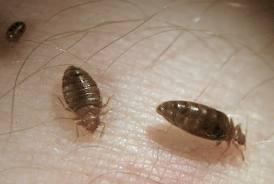
Understanding Bed Bug Bites on Black People: A Comprehensive Guide
Bed bug bites can be a source of discomfort and distress for anyone, regardless of their skin color. However, there is a common misconception that bed bug bites are more prevalent or severe on individuals with darker skin tones. In this article, we delve into the details of bed bug bites on black people, exploring the symptoms, causes, and treatment options.
What Are Bed Bug Bites?

Bed bugs are small, flat, parasitic insects that feed on the blood of humans and animals. They are reddish-brown in color and can grow up to 7mm in length. Bed bugs are nocturnal and typically feed on their hosts while they are sleeping. Their bites can cause itching, redness, and swelling, and in some cases, allergic reactions.
Are Bed Bug Bites More Prevalent on Black People?

There is no scientific evidence to suggest that bed bug bites are more prevalent or severe on individuals with darker skin tones. Bed bugs do not discriminate based on skin color, and anyone can be affected. However, there are some factors that may contribute to the perception that bed bug bites are more common on black people.
| Factor | Description |
|---|---|
| Urbanization | Bed bugs are more common in urban areas, where there is a higher concentration of people and more opportunities for bed bugs to spread. |
| Travel | Bed bugs can be easily transported in luggage, clothing, and furniture, making travelers more susceptible to bites. |
| Living Conditions | Bed bugs are more likely to thrive in crowded, unsanitary living conditions, which may be more common in certain communities. |
Symptoms of Bed Bug Bites on Black People

The symptoms of bed bug bites are generally the same for everyone, regardless of skin color. Common symptoms include:
- Itchy red bumps or welts on the skin
- Small, flat, or raised bumps that may appear in a line or cluster
- Swelling or redness around the bite area
- Darkening of the skin around the bite area, which may occur if the bite becomes infected
Causes of Bed Bug Bites
Bed bugs feed on the blood of their hosts, and their bites are a result of this feeding process. When bed bugs bite, they inject an anesthetic and an anticoagulant into the skin to prevent the host from feeling the bite and to keep the blood flowing. This injection can cause the skin to become inflamed and itchy.
Treatment Options for Bed Bug Bites
The treatment for bed bug bites primarily focuses on relieving the itching and preventing infection. Here are some common treatment options:
- Over-the-counter antihistamines or antipruritic creams to relieve itching
- Topical corticosteroids to reduce inflammation and swelling
- Warm compresses to soothe the skin and reduce itching
- Antibiotics if the bite becomes infected
Preventing Bed Bug Bites
Preventing bed bug bites involves taking steps to reduce the risk of infestation. Here are some tips:
- Inspect your home regularly for signs of bed bugs, such as small, dark fecal spots, shed skins, and live bed bugs
- Keep your bed linens, curtains, and furniture clean and free of clutter
- Use a vacuum cleaner to remove bed bugs and their eggs from your home
- When traveling, inspect your hotel room for signs of bed bugs and keep your luggage off the floor
- Wash your clothes and bedding in hot water after traveling
In conclusion, bed bug bites can affect anyone, regardless of skin color. Understanding the symptoms, causes, and treatment options can help you


